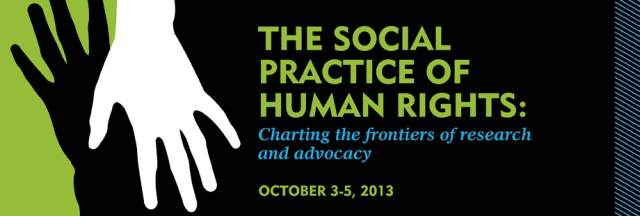Uneven Ground: Negotiating the Terrain of Human Rights Advocacy in Mexico
Location
River Campus - Room M2060
Start Date
10-4-2013 3:15 PM
Abstract
In the past twenty years, since the 1994 Zapatista revolution, Mexico has become a site of intense transnational advocacy regarding human rights. Mexico’s human rights practices have been the subject of growing scrutiny by the international community, especially with regard to the issues of indigenous rights, “feminicide,” the treatment of migrants, the use of torture by military and police, and the extreme levels of fear and violence associated with drug trafficking. This paper will map the relationships between international, national and local human rights NGOs and other actors in recognizing, framing and responding to human rights violations in Mexico. The paper will address the role of key actors in setting the advocacy agenda in Mexico, including governmental human rights institutions, international funders and international human rights organizations. While human rights advocacy in Mexico is varied and robust at all levels, from the local to the international, attention to the full spectrum of human rights issues remains uneven. The paper will highlight three key factors that shape human rights discourse and practice in Mexico: the prevalence of governmental human rights institutions, the impact of money from international funders in Europe and the United States, and the methodological practices used by international organizations.
Uneven Ground: Negotiating the Terrain of Human Rights Advocacy in Mexico
River Campus - Room M2060
In the past twenty years, since the 1994 Zapatista revolution, Mexico has become a site of intense transnational advocacy regarding human rights. Mexico’s human rights practices have been the subject of growing scrutiny by the international community, especially with regard to the issues of indigenous rights, “feminicide,” the treatment of migrants, the use of torture by military and police, and the extreme levels of fear and violence associated with drug trafficking. This paper will map the relationships between international, national and local human rights NGOs and other actors in recognizing, framing and responding to human rights violations in Mexico. The paper will address the role of key actors in setting the advocacy agenda in Mexico, including governmental human rights institutions, international funders and international human rights organizations. While human rights advocacy in Mexico is varied and robust at all levels, from the local to the international, attention to the full spectrum of human rights issues remains uneven. The paper will highlight three key factors that shape human rights discourse and practice in Mexico: the prevalence of governmental human rights institutions, the impact of money from international funders in Europe and the United States, and the methodological practices used by international organizations.




Comments
This biennial conference provides a unique space for scholars, practitioners and advocates to engage in collaboration, dialogue and critical analysis of human rights advocacy — locally and globally. Learn more about the Human Rights Center at the University of Dayton >>>.